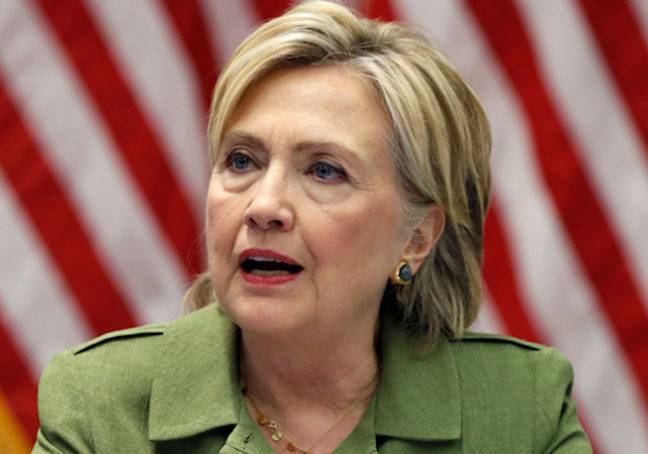NEW YORK - Hillary Clinton said Thursday that misogyny "certainly" played a role in her bruising defeat to Donald Trump in last year's US presidential election, giving her first public interview since that shock loss.
"I don't know that there is one answer," she told the Women in the World Summit in New York when asked why a majority of white women voted for a Republican who had boasted of groping women. "Certainly misogyny played a role, I mean that just has to be admitted," added the former secretary of state, who was treated to an ecstatic welcome and standing ovation from the crowd.
"I think in this election there was a very real struggle between what is viewed as change that is welcomed and exciting to so many Americans and change which is worrisome and threatening to so many others. "And layer on the first woman president over that and I think some people, women included, had real problems," she told a New York Times journalist at the ticketed women's empowerment event held each year.
While the vastly experienced Clinton won the popular vote, she lost the electoral college to the businessman who had never previously held public office, upending the world and the US political establishment. Having dreamt for years of making history as America's first woman president, Clinton admitted the aftermath had been "devastating."
Meanwhile, the CIA had evidence that Russia was interfering in the 2016 US election to boost Donald Trump earlier than previously thought, the New York Times reported. Russia's interference was not made public until months after Trump's November 8 election victory, with US intelligence chiefs openly accusing Russian President Vladimir Putin of masterminding a hacking and disinformation campaign to skew the election results.
Citing former government officials, The Times said secret briefings much earlier in the presidential campaign had revealed Russia's move to support Trump - as well as divergence between the Central Intelligence Agency and the Federal Bureau of Investigation, which is in charge of counterintelligence.
FBI senior officials had held that Russian hacks of Democratic Party communications were aimed at disrupting the election, without the specific goal of electing Trump. The agency later reached the same conclusion as the CIA.
John Brennan, the former head of the CIA, began in August secretly briefing top members of Congress on early, CIA-detected signs of possible collusion between Trump's inner circle and the Russians.
The FBI confirmed in March that it was probing whether Trump campaign aides had worked with the Russian effort to influence the election.
Two congressional intelligence committees have also launched investigations into the allegations.
Trump has vehemently denied accusations of collusion, and so far no evidence has publicly surfaced.
The former Democratic presidential nominee spoke at length, covering a range of issues that included calling on the United States to take out Syrian air fields in the wake of a suspected chemical weapons attack.
"I really believe that we should have and still should take out his air fields and prevent him from being able to use them to bomb innocent people," she said of Syrian leader Bashar al-Assad.
She slammed Russian interference trying to sway the outcome for Trump as "an act of aggression," warned Moscow was capable of doing it, and called for a bipartisan commitment to make sure it did not happen.
"Everything that has come to light in the days and weeks since have been all so troubling so I just had to make up my mind that 'yes, I was going to get out of bed," she said.
The 69-year-old is now slowly emerging from post-election seclusion to make speeches, promote young people and to encourage more women to get involved in politics. In the first weeks, she largely disappeared from public view, walking in the woods outside her Chappaqua, New York home.
Clinton said family and friends "rallied around me in an amazing way" and used the platform Thursday to level barbs against the Trump administration, which she said was going through "some very public growing pains." "As a person, I'm ok. As an American I'm pretty worried," she said.
"The things that come out of some of these men's mouths, like why do we have to cover maternity care? Oh I don't know, maybe you were dropped by immaculate conception?" she said.
While the former first lady and senator chalked up her electoral defeat to "lots of contributing factors" she admitted there were "certainly" things and she and her campaign could have done better.
But she repeated blame dished out last year before campaign donors that FBI intervention over her email scandal and Russian attempts to sway the outcome of vote in Trump's favor were chiefly to blame.
Russian President Vladimir Putin, she said, wanted to destabilize Europe, NATO and the United States and was personally opposed to her after she criticized Russian elections while secretary of state. "He's not exactly fond of strong women," she said of Putin.
The former candidate finished by saying she had no plans to run for office again.
"I am really focused on just doing some things that I think I can help make a difference with, like this supporting of young people and getting more women into politics, and I very much want to help Democrats take back the Congress," she said to cheers.
"I am looking at doing interesting things - I don't think that will include ever running for office again," she added.






